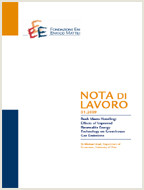Climate Engineering under Deep Uncertainty and Heterogeneity

20.07.2016
Q53, Q54
Climate Change, Solar Radiation Management, Uncertainty, Robust Control, Differential Game
Mitigation, Innovation and Transformation Pathways
Massimo Tavoni
Climate Engineering, and in particular Solar Radiation Management (SRM) has become a widely discussed climate policy option to study in recent years. However, its potentially strategic nature and unforeseen side effects provide major policy and scientific challenges. We study the role of the SRM implementation and its strategic dimension in a model with two heterogeneous countries with the notable feature of model misspecification on the impacts from SRM. We find that deep uncertainty leads to a reduction in SRM deployment both under cooperation and strategic behavior, which is a more relevant issue if countries act strategically. Furthermore, we demonstrate that the heterogeneity in impacts from SRM has an asymmetric effect on the optimal policy and could typically lead to unilateral SRM implementation. We also consider heterogeneous degrees of ambiguity aversion, in which case the more confident country only will use SRM.
***
Suggested citation: Emmerling, J., V. Manoussi, A. Xepapadeas, (2016), ‘Climate Engineering under Deep Uncertainty and Heterogeneity’, Nota di Lavoro 52.2016, Milan, Italy: Fondazione Eni Enrico Mattei
